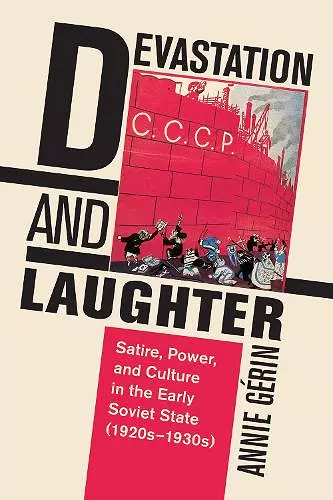Devastation and Laughter
Satire, Power, and Culture in the Early Soviet State (1920s-1930s)
Format:Hardback
Publisher:University of Toronto Press
Published:2nd Nov '18
Currently unavailable, and unfortunately no date known when it will be back
This hardback is available in another edition too:
- Paperback£24.99(9781487526542)

In Devastation and Laughter,Annie Gérin explores the use of satire in the visual arts, theatre, cinema, and the circus under Lenin and Stalin. Gérin traces the rise and decline of the genre and argues that the use of satire in official Soviet art and propaganda was neither marginal nor untheorized. The author sheds light on the texts written in the 1920s and 1930s by Anatoly Lunacharsky, the Soviet Commissar of Enlightenment, and the impact his writings had on satirists. While the Avant-Garde and Socialist Realism were necessarily forward-looking and utopian, satire afforded artists the means to examine critically past and present subjects, themes, and practice. Devastation and Laughter is the first work to bring Soviet theoretical writings on the use of satire to the attention of scholars outside of Russia. By introducing important bodies of work that have largely been overlooked in the fields of art history and film and theatre history, Annie Gérin provides a nuanced and alternative reading of early Soviet art.
"Gérin’s work is theoretically informed but not overburdened, her focus being cultural history and close reading of visual materials. It is in the selection and dissection of such print materials as posters and journals that Gérin truly excels."
-- Tom Haxhi, Department of Slavic Languages, Columbia University * Canadian Slavonic Papers, vol 61 no 3 *"Deploying both contemporary and historical theories of the comic, Gérin makes a persuasive case for the continuity of Russian humor culture through the centuries."
-- Maya Vinokour, Department of Russian and Slavic Studies, New York University * Slavic Review *"Gérin reveals that the Bolsheviks understood theories of laughter and sought to shape it for their own purposes. Satire and its laughter, they believed, could destroy the old bourgeois attitudes needed to create new people."
-- Stephen M. Norris, Department of History, Miami University * American Historical Review *"Gérin’s book, thoroughly researched, convincingly argued, and lavishly illustrated, sharpens the appetite for more discussions on satire and on caricature, as much from the early Soviet era as from the years of the Cold War and perestroika."
-- Katarzyna Murawska-Muthesius, Birkbeck College, University of London * H-SHERA *"Gérin’s book tackles many interesting issues that can inspire future humour-related research across a variety of disciplines."
-- Anastasiya Fiadotava, University of Tartu * European Journal of Humour Research *"Carefully documented, Gerin’s book provides a very precious contribution on Soviet visual humour."
-- Ada Ackerman, THALIN/CNRS * RACAR *"A valuable resource for teachers of Russian culture and students interested in the Soviet arts."
-- Olga Velikanova, University of North Texas * Kritika- Winner of CHOICE Outstanding Academic Titles of 2019 awarded by the American Library Association 2019 (United States)
- Short-listed for 2020 AATSEEL Best Book in Cultural Studies American Association of Teachers of Slavic and East European Languages 2021 (United States)
ISBN: 9781487502430
Dimensions: 231mm x 155mm x 25mm
Weight: 600g
282 pages